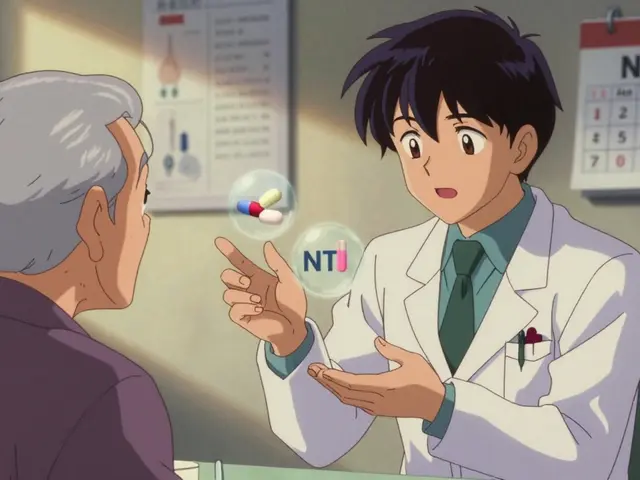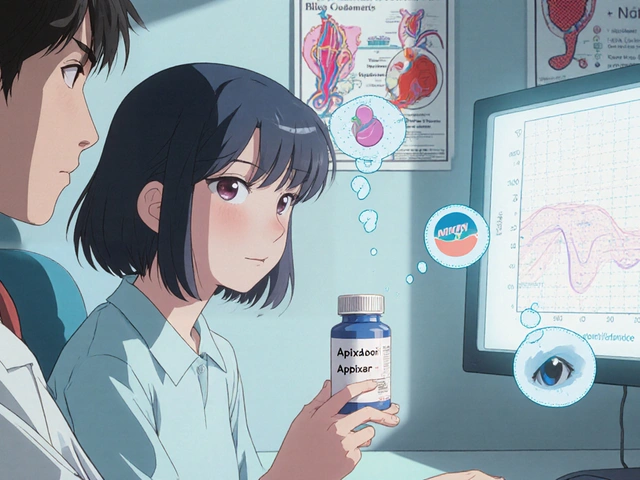If you’ve ever had heartburn strong enough to make you sleep upright or burp through your favorite movie night, there’s a good chance someone handed you a proton pump inhibitor, or PPI. They’re the big guns of the heartburn world—esomeprazole, omeprazole, lansoprazole—big promise, quick relief, and usually, nobody talks much about what happens when you take them month after month. But PPIs hold secrets. Some of them aren’t so friendly, especially when they linger in your medicine cabinet for too long.
What Actually Happens When You Take PPIs for Months or Years?
PPIs are designed to stamp out acid production in your stomach. At first, it feels like magic if you have GERD or persistent heartburn. But here’s the catch: your stomach acid exists for good reasons. One of its top jobs is to break down food and help you suck up key nutrients like magnesium, calcium, and vitamin B12. So when you take away the acid, your body makes adjustments, and not all of them are beneficial.
By the six-month mark, studies have found a measurable drop in your body's reserves of magnesium. Low magnesium isn’t just a pesky lab result; it can zap your energy, give you muscle cramps, and even mess with your heart rhythm. Stay on PPIs longer, and you're also rolling the dice with bone health. Postmenopausal women, for instance, see bone thinning accelerate, not because the heartburn went away, but because their calcium absorption tanked. There’s also the B12 trap—long-term suppression of stomach acid means the body struggles to free B12 from food. This can creep up as tingling in your hands, unexplained fatigue, and even memory glitches.
Also, stomach acid is your first line of defense against gut bugs. With less acid, you’re suddenly a more appealing host for things like Clostridioides difficile (C. diff), a nasty bacteria that can turn a simple trip to the bathroom into a medical emergency. PPIs don’t just stop heartburn; they open the door to stomach and gut infections that would have been held at bay by a fussy, acidic environment.
Let’s talk stats. A real-world analysis from 2023 found that people on PPIs for more than a year had a 44% greater risk of developing chronic kidney disease compared to those who weren’t popping those pills. What’s more, the FDA has flagged the risk of low magnesium and C. diff infections officially—so this isn’t something buried in boring medical textbooks.
| Risk | Relative Increased Risk (Long-Term Use) |
|---|---|
| Hip fracture | 30-40% |
| Chronic Kidney Disease | 44% |
| C. difficile Infection | 65% |
| Severe Magnesium Deficiency | Up to 50% more likely |
If you’re taking a PPI for more than three months, and proton pump inhibitor side effects never crossed your mind, now’s the time to start paying attention.
The Hidden Signs You Might Be Missing
You’d expect that if a pill was slowly changing how your body works, you’d feel something obvious, right? Not with long-term PPI use. The side effects tiptoe in—sometimes so quietly that your doctor might miss them unless they’re looking.
Some of the most common warning signs include weird muscle twitches, leg cramps you blame on bad shoes, or headaches you brush off as work stress. If your hair is thinning, you feel pins and needles, and your mood feels off, it’s easy to blame aging or a rough week. But often, these are clues from your nervous system, hinting at low magnesium or vitamin B12. Trust me—your body tries to tell you when something is off, but the messages aren’t always in a language you expect.
Another red flag? Suddenly catching colds or stomach bugs more than your friends. With less stomach acid, you’re easier prey for bacteria and viruses. Pay attention to bathroom drama, too. Diarrhea, abdominal discomfort, or bloating that didn’t use to bother you might actually signal those hidden infections or changes in your gut bacteria, all thanks to that daily PPI habit.
Then there’s the issue of bones. Most people don’t feel their bones getting weaker, but over years, a simple stumble can lead to a broken wrist or hip, especially for those over 60. This is linked directly with lower calcium absorption from suppressed acid.
- Feeling unusually tired, especially with brain fog.
- Sudden muscle cramps, spasms, or heart palpitations.
- Unexplained brittle nails or weak hair.
- More frequent infections—especially gut and respiratory bugs.
- Digestive symptoms that are new or getting worse, not better.
- Tingling or numbness in hands and feet.
- New aches or pain in your bones or joints.
If any of these feel familiar, it’s time to have a real conversation with your doctor. Don’t chalk up new health annoyances to getting older or just "being tired." These are classic signs your body isn’t loving the long-term absence of stomach acid.

How to Monitor Your Health If You’re Stuck on PPIs
Maybe you can’t just quit your PPI tomorrow. For folks with severe reflux, Barrett’s esophagus, or ulcers, that pill is a lifeline. But if you’re settling in for the long haul, you need a plan to keep your health in check. Monitoring is the name of the game, and you can do a lot more than wait for something to go wrong.
Ask your doctor to check your magnesium, calcium, and vitamin B12 levels at least once a year. These tests are simple blood draws—done along with your basic physical or wellness workup. If you’re a postmenopausal woman or over 65, push for a bone density scan every couple of years to watch for silent bone loss. Even young people can see changes, though, so don’t write yourself off if you’re under 40.
Another smart move is to log your symptoms. Track things like muscle cramps, fatigue, digestive changes, and how often you get sick. Keep a running note on your phone or old-school notepad, and bring it to appointments. Patterns are easier to catch over weeks than in a rushed ten-minute doctor visit.
Pro tip: Be wary of adding supplements without checking labs first. If magnesium is low, your doctor can recommend dose and type (glycinate is better for absorption than oxide, for example). Piling on “just in case” vitamins can backfire and cause problems of their own.
Finally, stay hydrated and boost your diet with naturally magnesium-rich foods like pumpkin seeds, spinach, and black beans. For B12, animal proteins (beef, eggs, dairy), or fortified foods suit most diets; vegans and vegetarians should consider regular B12 checks and the right supplements.
| What to Monitor | How Often |
|---|---|
| Magnesium Level | Yearly or as symptoms appear |
| Vitamin B12 | Yearly or with unexplained fatigue/neuropathy |
| Calcium Status / Bone Scan | Every 1-2 years if at risk |
| Kidney Function (Blood Creatinine / eGFR) | Yearly |
| Infection History / GI Illnesses | Track ongoing |
If you ever find yourself on antibiotics or develop diarrhea that just won’t quit, let your healthcare provider know immediately—C. diff can get dangerous quickly, especially in long-term PPI users.
When and How to Consider Switching Off PPIs
Not everyone can or should stop their PPI cold turkey. Abruptly quitting can cause a nasty rebound—heartburn comes roaring back even worse than before. But sticking with a medication out of habit can set you up for problems down the road, especially if your only original reason for starting was mild heartburn or occasional indigestion.
If your main symptoms have cooled down, or you’re just taking the pill out of routine, have a heart-to-heart with your doctor. Many people can switch to an "on-demand" approach, just using a PPI a couple times a week when symptoms threaten to flare up, instead of taking one every day. Another strategy is to taper—cut the dose gradually, such as stepping down from 40 mg to 20 mg, then stretching how many days you go between doses. This reduces the rebound effect and gives your body time to adjust.
For some, older medications called H2 blockers (think famotidine or ranitidine) can help bridge the gap. These aren’t as powerful, but they have fewer side effects over time and are useful for mild heartburn, especially at night. Don’t forget about the impact of lifestyle tweaks: raising the head of your bed, eating smaller meals, losing even a little weight, and avoiding big, late dinners can make a dramatic impact for a lot of people.
Looking for more personalized options? There are helpful resources with a variety of esomeprazole alternatives. These can help you weigh the pros and cons of switching meds or trying new combos. Sometimes, a mix of safer drugs or natural strategies works just as well as sticking to a single pill forever—but you need to be smart about it and never cut off meds rapidly on your own.
- Talk to your doctor before making any switch—rebound acid can really sting.
- Ask about tapering, not quitting abruptly.
- Explore other types of acid reducers (H2 blockers, antacids) for milder symptoms.
- Keep up healthy habits to keep reflux in check.
- Be patient—your stomach might take weeks to adjust!
No matter your age, the secret is balance: not being stuck on PPIs out of habit, but also not risking your health chasing heartburn relief without support.

Smart Steps to Stay Safe With or Without PPIs
PPIs will always have a place for tough cases, but being aware of their long-term risks helps you stay in charge of your health. Start by knowing why you’re taking them, what the short and long-term game plans are, and what signs to watch for. If you’re on PPIs for more than a few months, push for those regular checks—magnesium, B12, kidney function, and bone health.
Be proactive about lifestyle changes: a few less greasy meals, no midnight ice cream, and not crashing on the couch right after dinner can go a surprisingly long way. Move more, even if it’s just walking after dinner. If you smoke, quit, and if you drink, cut back. Write down and track your symptoms so you’re not stuck guessing when things start to change.
If you ever feel ignored or brushed off when asking about PPI side effects, find a provider who listens. Your health and your peace of mind are worth it. And remember—while heartburn hurts in the moment, ignoring the quiet, slow-motion risks of long-term PPIs can set up even bigger issues down the line.
People who take control, ask questions, and watch for these red flags can steer around a lot of trouble. Whether you stay on your PPI, switch to something new, or try a blend of medications and lifestyle changes, you’ve got the info you need to make your health the priority.







Nicholas Blackburn
July 17, 2025 AT 22:17Let me tell you, people are just blindly popping proton pump inhibitors like candy without even considering the long-term nightmare lurking beneath. Vitamin deficiencies? Dangerous infections? Yeah, sure, it’s not just a little heartburn relief, it’s ticking time bomb for your health.
And what really grinds my gears is how little the medical community warns about these risks until it’s too damn late. Anyone seriously relying on PPIs needs to wake the hell up and consider other options before that damage is irreversible. Honestly, if you’re not questioning your meds after reading this, you’re fooling yourself.
Dave Barnes
July 20, 2025 AT 14:10You know, the human body is kind of a wondrous labyrinth of cause and effect, and the use of PPIs fits nicely into this paradox. Sure, they silence the acid dragon temporarily, but at what cost do we mute these natural processes? It’s like trying to fix a leak by smashing the whole pipe shut.
But then again, not all who wander are lost; perhaps understanding these risks is only the beginning of a greater dialogue about health and balance rather than outright condemnation of a medical tool sometimes needed. A more nuanced approach is needed, methinks.
Kai Röder
July 23, 2025 AT 06:04While the warnings around prolonged PPI use are important to heed, it’s equally crucial to approach the subject with balance and care. For many patients, these medications have proven invaluable when lifestyle changes and alternative therapies fall short.
It’s about personalizing treatment plans — patients should have access to information about risks so they can engage in shared decision-making with their healthcare providers. Reducing unnecessary long-term usage without compromising symptom control is the goal.
Has anyone here had experience consulting with their doctor about stepping down PPI use? I’d love to hear some success stories or strategies.
Brandi Thompson
July 25, 2025 AT 21:57Honestly, the way these drugs just sneak in and wreck havoc on your system over time is utterly infuriating. Like, who thought it was smart to hand out PPIs like candy and then shrug when folks start developing infections or nutrient problems? It’s a slow poisoning disguised in convenience.
And the absolute worst part? So many people are left in the dark until their health spirals. There has to be more awareness and stricter guidelines about really understanding what you’re signing up for with these meds. It’s a total disaster waiting to happen and we need to shout it from the rooftops before more people suffer.
Chip Hutchison
July 28, 2025 AT 13:50This article brings up some valuable points about the risks of long-term PPI use, and it’s a conversation that needs to be had more often. As someone who’s supported friends through reflux issues, I’ve seen how frustrating it can be relying solely on medication.
That said, it’s encouraging to learn about safer alternatives and warning signs. Maybe integrating dietary changes, mindfulness practices, and occasional medication can really reduce dependency while maintaining comfort. What do you all think about holistic approaches versus traditional pharmaceuticals here?
Emily Moody
July 31, 2025 AT 05:44It’s tragic how these 'wonder drugs' have been lauded while silently siphoning vitality from the American populace like some insidious, shadowy cabal. PPIs’ side effects are far from minor; they represent a gross miscarriage of medical stewardship. We must demand more from those entrusted with public health.
The alternatives, though discussed, remain buried beneath layers of jargon and complacency. It’s high time the masses recognize the storm brewing beneath their seemingly innocuous prescriptions and push for more transparent, holistic treatment paradigms.
Prateek Kohli
August 2, 2025 AT 21:37Hey there! This topic really hits close to home for me. I’ve been educated about PPIs and their risks, and what helped me the most was a combined approach — I adjusted my diet, managed stress better, and used medication as a last resort instead of regularly.
While it’s scary reading about the side effects, I appreciate that the article points out early warning signs and alternatives because not everyone gets this info from their docs upfront. Balancing these elements is key for me, and maybe for others too. 😊
Noah Seidman
August 5, 2025 AT 13:30All these discussions on the risks of long-term PPI use are overblown if you ask me. People love to jump on the fear-mongering bandwagon without considering medical necessity. Controlled use prescribed by a competent doctor isn’t some death sentence.
Before we scare patients off essential treatment, we need to remember that not all meds are villains, and sometimes the benefits outweigh risks. Responsibility lies in proper monitoring, not blanket condemnation.
Anastasia Petryankina
August 8, 2025 AT 05:24Oh, wonderful. Another article to add fuel to the paranoia fire about common meds. Honestly, the way these things get blown out of proportion is almost artistic. I’m sure there are risks, but how about some moderation rather than jumping straight to "dangerous infections" and "vitamin deficiencies"?
People want to live in constant fear of their prescriptions, and that’s just exhausting. Maybe focus on evidence and actual statistics instead of alarmist headlines.
Tim Ferguson
August 10, 2025 AT 21:17Does anyone else feel like these meds are paradox jigsaw pieces we’re trying to force into a shape not meant for them? PPIs fix symptoms but often create other, sometimes more serious, issues.
It’s a tricky balance — do we just tolerate discomfort or risk serious complications? It mostly comes down to individual body responses, I guess. Still, I’m curious about anyone’s experience with stepping off PPIs and what alternatives genuinely worked for them.
Noah Cokelaere
August 13, 2025 AT 13:10Wow, this discussion is really eye-opening. I’ve often wondered about the long-term consequences of relying on these inhibitors, especially since they seem like such an easy fix.
From what I gather, it's super important to stay informed about side effects and communicate openly with your doctor about alternatives. Maybe the true art of managing acid reflux lies in balancing medication with lifestyle changes and mindfulness rather than defaulting to pills.
Also, anyone here tried any natural supplements or dietary tweaks that actually helped reduce their need for PPIs? Would love to hear if those worked!